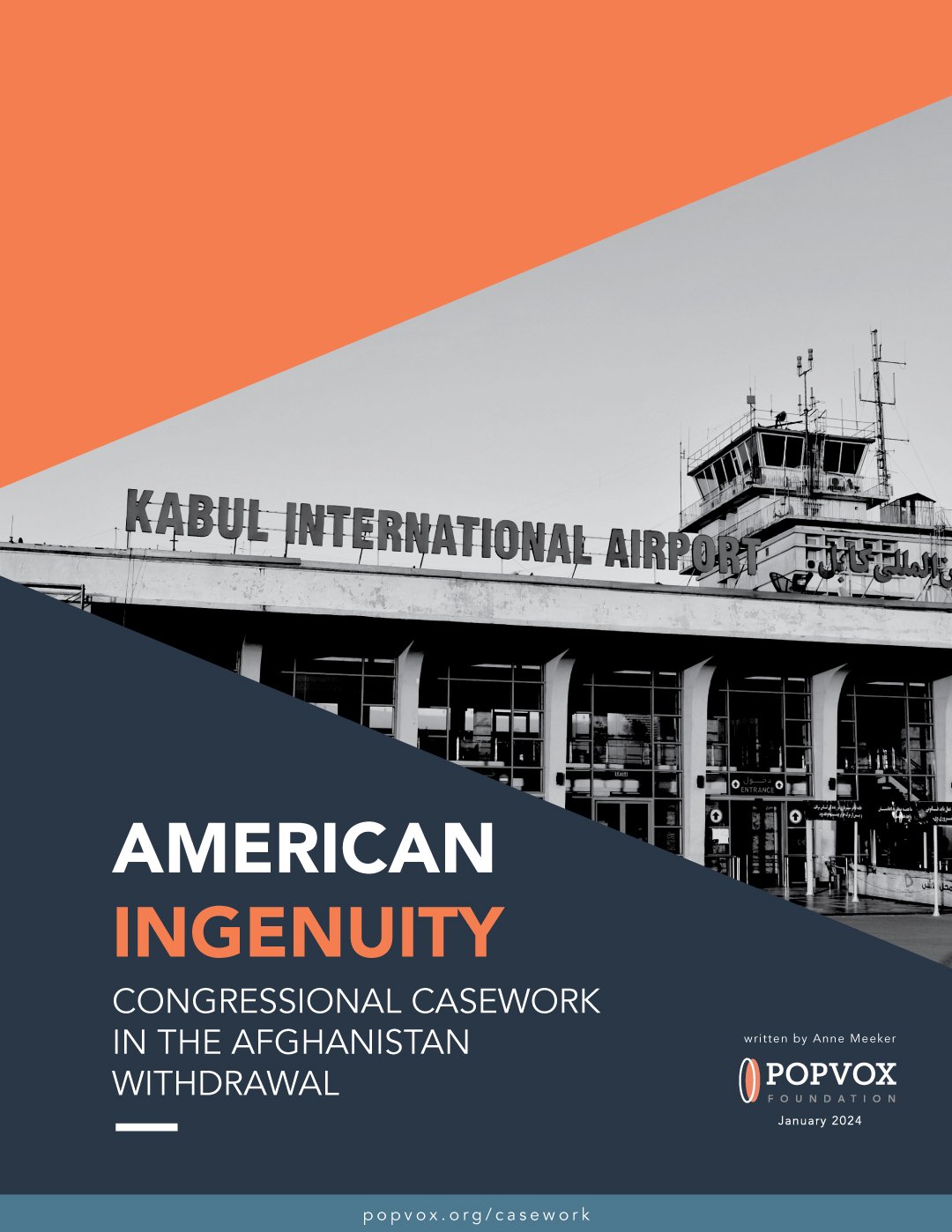Introduction
Download (PDF)
In August of 2021, US military forces withdrew from Afghanistan in a chaotic scene that left the Taliban in control of the Afghan capital, government, and Hamid Karzai International Airport (HKIA). Fearing retribution, Afghan citizens who had served with the United States military and contractors or otherwise assisted the US government were desperate to escape the country with their families. Media footage showed the panic at the airport, with scenes of people clinging to departing aircraft, and frantically appealing to US Marines on the airport walls.
In the context of the military withdrawal, Congressional offices received thousands of calls for help from Afghans on the ground in the country, their family members in the US and Afghanistan, and service members and veterans frantically trying to assist their interpreters, supporters, and friends. While these inquiries were way outside the realm of normal constituent communication, they were still funneled through the group of legislative staffers tasked with routine problem-solving on behalf of individual constituents: Congressional caseworkers.
“Casework,” also known as constituent services, is the practice whereby Members of Congress and their staff work on behalf of constituents to resolve problems with federal agencies, in accordance with the law.¹ Casework is far from the most well-known or prestigious staff role in Congress: Caseworkers handle some of the most technically and emotionally demanding front-line constituent engagement in Congressional service, and are based primarily in state and district offices, far from Washington, DC. From tracking down missing tax returns and delayed VA benefits to resolving Social Security overpayments, contradictory immigration notices, and more, caseworkers deliver tangible impacts for constituents through deep knowledge of agency programs and processes, but they are rarely central in the policymaking process. They are the duct-tapers and gap-fillers of the federal government, the safety net’s safety net — usually the “hail-Mary” option of last resort for constituents when normal customer service channels in government fail. Caseworkers’ work is also often central to Members’ (and challengers’) messaging about their dedication and connectedness to their districts and states.² It is also one of the few areas of Congressional service characterized by almost exclusively nonpartisan collaboration between offices to directly serve constituent needs.
In the withdrawal and continuing over the last two years, caseworkers worked to triage and support American allies in life-or-death situations. Afghanistan casework pushed casework teams to their limits with never-before-seen volumes of inquiries, higher-than-ever stakes, and broken or rapidly-breaking agency inquiry processes. It also pushed caseworkers to find new ways of self-organizing, sharing information, collaborating with broad coalitions, and produced tangible results with thousands of Afghan allies reaching safety due to their combined efforts. For the caseworkers most deeply involved, the Afghanistan withdrawal was a clear nadir in Congressional service — and simultaneously some of their most meaningful and rewarding work. As former Rep. Keating [D, MA] caseworker Jessica Bradley Rushing put it:
“The thing to highlight is that what happened with Afghanistan is a single incident, but it will happen again. It wasn’t a one-time thing. We have the ability to learn lessons and improve processes if we take the opportunity presented to us. As we look forward in time, we won’t be faced with fewer crises. Taking the bull by the horns while we have the chance to fix these things — so in the future we’re not reactive but have put in place structures to allow us to be proactive in these crises — is financially responsible, morally responsible, and the right thing to do.”
Afghanistan casework was a small piece of the tragedy of the Afghanistan War and subsequent withdrawal. For institutionalists and modernizers invested in strengthening Congress, it is an important example of the human toll of Congress’ underinvestment in its own capacity — and one that points to the strength, creativity, and dedication of Congress’ workforce. This report presents a narrative account of that effort, and points to ways that Congress can tap into its strengths to evolve in the 21st century and beyond.
This report has two goals:
1. Recognize the efforts of the dedicated Congressional caseworkers who worked to support American citizens and Afghan allies during the Afghanistan withdrawal.
While other after-action reports from the Afghanistan withdrawal exist, they have largely focused on the actions of senior officials in the Executive branch. This report focuses on the Afghanistan withdrawal specifically from the perspective of Congressional caseworkers tasked with responding to Afghanistan-related inquiries from Americans, allies, and their families and supporters from 2021 to present.
2. Provide targeted recommendations to strengthen Congressional casework and support caseworkers.
Addressing problems with Congressional casework will allow the House and Senate to more effectively serve constituents, support vital front-line staff, and uphold Congress’s Article One responsibilities. Using the Afghanistan withdrawal as a case study for where current institutional support for casework may be improved, this report presents a vision for casework that leverages modern technology to strengthen Congressional effectiveness in constituent service.
¹ “Casework Basics: Definition and Rules,” POPVOX Foundation (March 2023)
² For recent samples, see:

